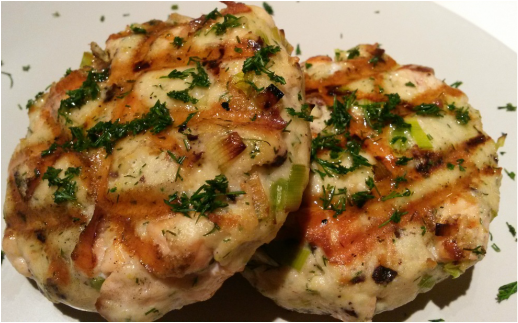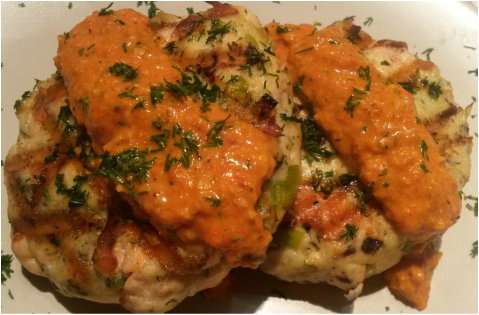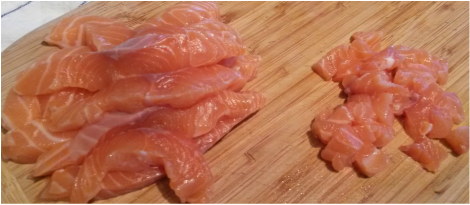Serves 4
This recipe accentuates rather than diminishes the delicate buttery flesh of wild king salmon. By pairing the salmon with lightly sautéed leeks, lemon zest, Dijon, and olives’ slight brine, the distinct but mild flavor of the salmon is brought out. While most fish burgers or cakes use breadcrumbs as binding, this ingredient just dilutes the fish’s real flavor and adds no nutritional or culinary value. The key to a complex texture and flavor profile is to process half of the amount of salmon in the recipe with aromatic seasonings and a small amount of almond flour. Medium dice the rest of the salmon and fold it in with the smooth base while adding finely chopped dill, olives, and leeks. This method results in a tender, juicy, and scrumptious burger.
Each wild salmon, leek, and olive burger contains roughly 30 grams of protein (Oaklander 1). By lightly grilling the patty, you can create a protein-packed meal without the harmful fats created through frying or sautéing. In addition, wild salmon contains a significant amount of the healthy omega-3 fatty acids, as well high levels of selenium, magnesium, and phosphorus (Kerns 1).
While I am generally against freezing fish because it does impact the texture, if you have a busy life these burgers can be made ahead of time, frozen, and then defrosted and grilled for an easy weeknight dinner—just be sure to drain the burgers of any excess moisture before grilling.
1.5 pounds wild king salmon
1 tablespoon lemon zest, chopped
½ cup almond meal, finely ground
1 tablespoon Kalamata or Castelvetrano olives, rinsed and finely chopped
½ cup leeks, small diced and rinsed
3 tablespoons extra virgin olive oil (2 for the salmon mixture, 1 for sautéing the leeks)
2 teaspoons Dijon mustard
1 tablespoon fresh dill, finely chopped
1.5 teaspoons salt
1. Clean the salmon of any skin, and gently rinse the flesh under cold water. Allow the salmon to dry, and cut half of it, or ¾ pound, into large cubes. Place the cubes in a food processor with the lemon zest, almond meal, salt, two tablespoons of olive oil, and mustard. Process until just smooth.
2. Scrape the salmon mixture into a stainless steel bowl and set aside in the refrigerator.
3. Prepare the leeks by gently sautéing them in olive oil. Do not allow the leeks to brown—they key is to just cook them through. Once they are cooked, set the leeks aside to cool.
4. Slice the remaining salmon into 1/2-inch slices, and then dice the slices so that you have ½ inch diced pieces of salmon.
5. Take the salmon mixture out of the refrigerator and add the diced salmon, finely chopped dill and olives, and cooked leeks. Gently fold the ingredients together so that they are evenly mixed.
6. Form the salmon burgers. Aim for four burgers and a thickness of 1.5 inches for each burger.
8. Place the burgers in the freezer for about 25-30 minutes so that they set and become firm (you don’t want to completely freeze the burgers but just stiffen them).
9. Preheat the grill to medium-high heat.
10. Brush the grill grates with a rag that is damp with olive oil.
11. Place the burgers on the grill and allow them to cook for about 3-4 minutes on each side. Do not over cook the burgers—you still want a little pinkness in the center—aim for medium doneness.
12. Pull the burgers from the grill and immediately serve with a generous dollop of fresh Lemon-Basil Aioli (the aioli recipe is at the end of this recipe: http://www.gabriellemyers.com/gluten-and-dairy-free-recipe-blog/-cornmeal-crusted-black-bean-zucchini-cakes-with-lemon-basil-aioli), Romesco sauce (see the second picture—recipe to come in summer 2020!), or Parsley and Olive Sauce (http://www.gabriellemyers.com/parsley-and-olive-sauce.html).
Works Cited
Kerns, Michelle. "The Health Benefits of Alaskan Salmon." SF Gate n.d.: 1. Web. 5 Jan. 2016.
Oaklander, Mandy. "Should I Eat Salmon?" Time (2015): 1. Ebscohost. Web. 5 Jan. 2016.



 RSS Feed
RSS Feed